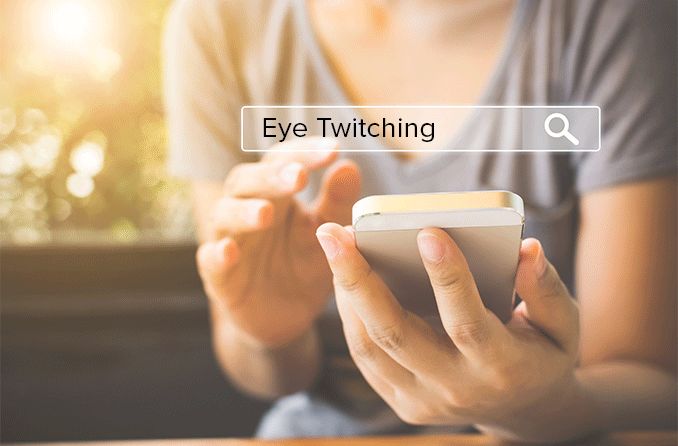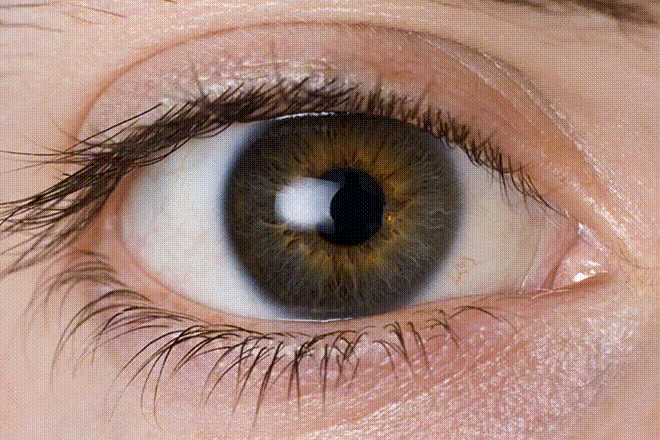What it means when your eye twitches

Eye twitching can mean different things to different people, depending on their knowledge of science, cultural beliefs and social awareness. Even with several known triggers, it’s difficult for doctors to explain why fatigue, caffeine and stress actually cause an eye to twitch.
Depending on your perspective, an eye twitch can:
Tell you something about yourself: Maybe you’re feeling stressed or tired.
Tell someone else something about you: You may come across to others as frustrated or irritable.
Tell you something about your future: Perhaps some good or bad luck is headed your way.
This multitude of ideas and speculations on what an eye twitch means, without a concrete answer, makes the facial tic somewhat of a mystery.
What eye twitching can tell you
If you feel your eye starting to twitch, it could be your body’s way of saying:

You’ve had too much caffeine or alcohol.
You need more sleep.
You are overly stressed.
Your allergies are especially bad.
Your eyes are strained.
You’re missing some key nutrients in your diet.
If any of these causes make sense in your current situation — for example, there’s a really big project due soon at work, the pollen count is extra high or you haven’t been eating as healthily as usual — you may find relief when that project gets turned in, the pollen count goes down (or your allergy medicine finally kicks in), or you get back to better nutrition.
It’s common to find the solution to eye twitching in lifestyle moderation and management.
What your eye twitching may tell others
When someone’s eye twitches on television, it typically means they’re angry, annoyed or on the brink of losing their sanity. Though it’s difficult to pinpoint who first used eye twitching to express a state of mind, the use of it in film and television — specifically in animation — has caused people to associate eye twitching with emotional instability.
Here are a few TV and movie characters whose eye twitch you may have noticed:
Louise Belcher in Bob’s Burgers
Sheldon in The Big Bang Theory
Donkey in Shrek
Mr. DeMartino in Daria
Chief Inspector Dreyfus in the Pink Panther movies
Ryuko Matoi in Kill la Kill
Hiel in Yu Yu Hakusho: Ghost Files
While a well-timed eye twitch can be a great way to indicate mood in a fictional setting, an eye twitch in real life rarely results from emotion. Unfortunately, because of the common association with emotion, someone might think the worst if they notice your eye start to twitch. They may perceive it as a sign that you are frustrated or irritated with them.
If a co-worker looks worried when your eye twitches, it’s probably a good idea to reassure them that they likely aren’t the cause. Though stress can cause an eye twitch, the reaction is not immediate — it typically follows an extended period of stress.
What eye twitching means for your future
Some cultures around the world believe that an eye twitch can foretell good or bad news. In many cases, a twitch (or jump) in the left eye is associated with misfortune, and a twitch in the right eye is associated with good news or future success.
The opposite tends to be true in Chinese culture, where a left eye twitch is typically associated with good news, and the right means bad news is headed your way. However, this can change depending on the time of day the eye twitch is experienced, as the Chinese zodiac calendar and the Chinese almanac are used to further decipher the meaning of your twitchy eye.
Meaning can also be drawn based on the precise location of the twitch. In parts of Africa, a twitch in the lower lid means a bout of crying may be on the way, while a twitch in the upper lid may signify the upcoming arrival of someone unexpected. In India, the placement of the twitch can indicate upcoming good or bad news, the loss or gain of money, or even the birth of a child.
In the Caribbean, the meaning of eye twitching is tied to your relationships with other people. Left eye twitching means someone is saying bad things about you or acting against you, or that a friend may be in trouble. If your right eye is twitching, any talk about you is positive, and you might get to reunite with a long-lost friend sometime soon.
While different cultures around the world attribute different meanings to eye twitching, there is no medical or scientific proof to support them. Positive or negative events following a left or right eye twitch are purely coincidental.
Medical attention for an eye twitch
Eye twitches are often mild and stop on their own after a few hours or days. Because of this, medical attention is rarely needed for an eye twitch unless:
Eye redness, swelling and/or discharge are also present.
The twitch has persisted for more than a week.
Other parts of your face and/or body are also twitching.
The twitch is strong enough to cause your eye to close completely or make your eye difficult to open.
If you experience any of the above symptoms in addition to your eye twitch, it’s important to see an eye care provider immediately. The presence of other symptoms could indicate a more serious issue.
Page published on Tuesday, 17 May 2022






